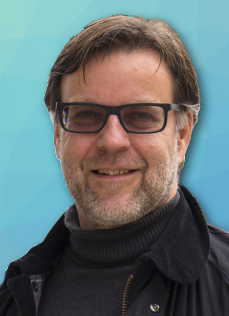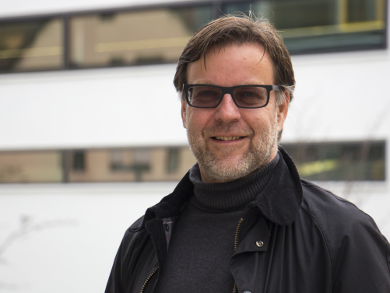In cooperation with partners from industry and academia, Professor Volker C. Hass, Furtwangen University, Furtwangen im Schwarzwald (HFU), Germany, has developed a unique operator training system for biotechnological processes. Like the flight simulators used to train pilots, the operator training system enables trainees to experience deceptively realistic working conditions. Biotechnology and process engineering students thus have a unique opportunity to use the training simulator to play through the process of producing biotechnological products.
Here, Professor Volker C. Hass speaks to Dr. Vera Koester for ChemViews Magazine about how the training simulator has been developed, how it is used, and how students benefit from it.
What was the idea behind developing this simulator?
The idea for this simulator is quite old. It began about 30 years ago, and I started the development in Jena around 2000. The first paper about this was published in Chemie Ingenieur Technik in 2005. Back then, it was called a virtual bioreactor [1].
The original idea for the simulator was to test automation systems. However, we soon discovered that it was a nice teaching tool and how much students liked to play with it. In the beginning, it was kind of a game for the students.
From there we had the idea that this simulator should be developed further to really become a training tool for academic use. Students should operate this bioreactor like a real bioreactor.
How is working with the simulator organized for the students?
As mentioned, today we are using it completely differently from how we did ten years ago. In the very beginning, we copied our lab description for a standard yeast production. We observed that working with the simulator helped the students perform better in the lab because the experiments with the simulator gave them an idea of what happens during the process. This was done at the Hochschule Bremen as well as in Sweden at Linköping University together with my colleague Carl-Frederik Mandenius and with Frank Baganz from University College London (UCL), UK. These first experiences motivated us to think about the concept of using the simulator further.
How is it used today?
Today, students can work with it as if they were sitting in front of a real bioreactor operating system and do all the things that you can do with a bioreactor, such as, increase the stirrer’s speed, draw samples, manipulate the feed substrate, etc.
During the preparation of a one-week pilot plant practical course, the students use the training simulator to plan their own process. We give them tasks like this: Please produce a certain amount of ethanol with yeast, maybe 200 grams. You can use everything we have in the pilot plant. You can try out how you will operate the reactor with the training simulator. Together with my colleague Holger Schneider, HFU, we developed a preparation seminar at the University Furtwangen in which we give the students some milestones that they should reach to structure the process a bit. It is a second-year project, in the fourth semester. The pilot plant week is still very challenging for the students.
During the seminar and the pilot plant week, the students organize themselves into groups of about eight. They have to elect a group leader and they need to plan their pilot plant tasks.
Do they all get the same task?
Yes, they do.
Don’t you have to change it so that they cannot copy from each other?
We change it sometimes, but it is not really necessary. If you have four groups, you will have four different ways of how the target shall be reached.
Can the students access the simulator whenever and wherever they like?
Yes. We provide the simulator on our computers, but the students can also have a version if they like.
So they can spend as much time as they like with the simulator.
Yes. On the one hand, the simulator makes it harmless for students to make errors; and it is cheap for the university. We do not have to pay for additional media, organisms, and so forth. On the other hand, however, the students are able to invest more time.
The advantage of having the computing time at the university is that it helps the students to be more target-oriented. They usually need around twelve hours. However, if the students spend more time on the computer, they learn more because they start “playing around” with it.
We also got many hints from the students as to where the operation of the simulator could be improved. This is also very interesting for us and indicates a good understanding of the students with respect to the bioprocess operation.
So you can follow what they are doing?
No, not automatically. They record operations, observations, and off-line “measurements” in their lab books, like in a real plant.
What are recent changes?
We have expanded the model from the simple yeast and ethanol production to the production of one component of kiwi aroma: ethyl-3-hydroxybutyrate. It is a whole-cell biocatalytic process, using the yeast cells as a biocatalyst. Ethyl-3-hydroxybutyrate is a precursor for some pharmaceuticals, so it not only has a nice smell, but it is also an important substance.
We have also embedded a slightly simplified bioethanol plant in the bioreactor simulator. It contains the growth of the microorganisms, the ethanol production, the separation of the yeast from the broth, and the ethanol distillation. The three unit operations are combined to one plant in the simulator. This is nowadays used in master’s courses at UCL. Students learn that it is one thing to run one unit operation optimally, but the trick is how to run three unit operations to get an optimal result.
They also learn that they have to rely on each other because they only have one trimester to optimize the performance of their plant. So they need to develop a strategy for how they can split up their group into different tasks. The students running the fermentation process need to rely on the students running the distillation process to optimize the results in the best way. And they have to be flexible, because if the fermentation gives different results the distillation students must react to that. So they need to communicate.
I think this communication aspect is very fascinating.
Yes. It is particularly interesting at UCL because some of the master’s students come from the more biological side, others more from the engineering side, and then they come from different cultures. We have Chinese, Indian, Pakistani, African, European, and American students all sitting together with different technical and scientific backgrounds. And they really need to find one solution in the end. Very, very interesting and fun.
Do they all succeed in the end?
Well, yes. They do. They obtain good solutions. And the best groups often surprise us. They find ways that we did not even think of at first. For us, it is very interesting.
I think the simulator offers a new teaching method. It really makes the students do it themselves. Problem-oriented learning with activated students. I did not know this when I thought of the idea 30 years ago.
You said the simulator has been used in London, Bremen, and Linköping. Is the tool limited to these three universities or do you sell it?
We have different versions and we sell them via a company. In addition, Ralf Pörtner from the Technical University Hamburg and myself published the textbook “Praxis der Bioprozesstechnik”. There, we also included a modified and simplified version of the simulator.
What fascinates you most about developing and optimizing such tools for students?
Actually, the group dynamics in the preparation of the course are the most fascinating. The students all begin very enthusiastically, then after some time, say half of the time, they have this typical project depression, and from there, they restructure themselves, restructure the work, improve the work, and by the end they are very engaged in their projects and the laboratory work. After the pilot week, they all say they are tired but happy and have learned a lot. This is something that really fascinates me.
Another aspect is how people work with the simulator and that you can individually react to their questions. The prior knowledge of students within just one class might be very different. They can use the simulator and learn things and can try it out on a more or less experimental basis. You can then adapt your teaching concept to the individual groups or the individual people and get them to try things out without blaming them. You do not say in front of the whole class “You are wrong.” or “This needs to be done this way.” Instead, you can say: “Well, maybe there is another option. Try it out that way and compare.” By doing so, you really encourage them to do their experiments and you do not need to show that you are the master and they are the student. They can learn a lot from themselves. That is what I like. This is fun for the trainers, as well.
And another thing is, I tried to put all my knowledge into the simulator. And it is an ongoing process. We continually improve the simulator.
So we—and your students—can be curious as to what you will add next. Thank you very much for this interview.
 Volker C. Hass studied mechanical engineering in Hanover, Germany, chemical engineering in Hamburg-Harburg, Germany, and got his master’s degree in biochemical engineering from the University of Birmingham, UK. He gained his Ph.D. from the Technical University Hamburg-Harburg under the supervision of Professors Axel Munack, Herbert Märkl, and Joachim Werther.
Volker C. Hass studied mechanical engineering in Hanover, Germany, chemical engineering in Hamburg-Harburg, Germany, and got his master’s degree in biochemical engineering from the University of Birmingham, UK. He gained his Ph.D. from the Technical University Hamburg-Harburg under the supervision of Professors Axel Munack, Herbert Märkl, and Joachim Werther.
After working at the Baubehörde (building authority) Hamburg, Amt für Wasserwirtschaft (department of water management), he moved back to science and worked at the Helmholtz-Zentrum Geesthacht, Germany, and became a Professor of Biochemical Engineering and Environmental Engineering at the University of Applied Sciences Jena, Germany, then a Professor of Chemical Engineering at the University of Applied Sciences Bremen, Germany, and has been a professor of biochemical engineering at the University of Applied Sciences Furtwangen, Germany, since 2012. In addition, Volker C. Hass is an Honorary Professor at University College London (UCL), UK, and Adjunct Professor of Biochemical Engineering at the Jacobs University Bremen.
References
[1] Volker C. Hass, Verbesserung der bioverfahrenstechnischen Ausbildung durch einen „Virtuellen Bioreaktor, Chem. Ing. Technol. 2005. https://doi.org/10.1002/cite.200407053 (in German)




